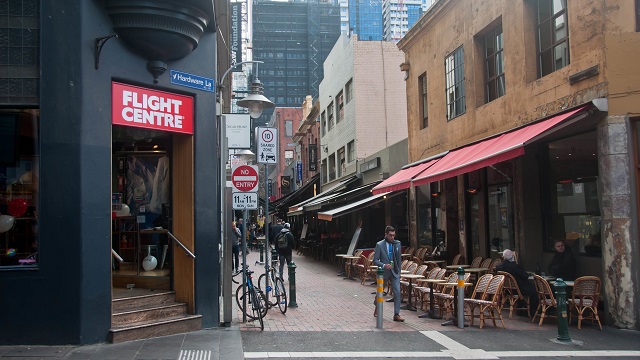

Only a few days after the Coalition government’s initial COVID-19 safety measures were announced, a second wave of mandatory shutdowns and distancing measures were announced on Tuesday evening.
As confirmed cases in Australia passed 2100, Prime Minister Scott Morrison announced beauty therapy, waxing, and tattoo and massage parlors are now to close alongside pubs, clubs, cafes and restaurants.
Food courts in shopping centres are no longer to allow sit down seating to discourage social contact, though food vendors in shopping centre malls will still be able to provide take away options.
This new stipulation could cause problems for shopping centre owners, which have been switching their model away from traditional retail and toward food courts and experiential retail for some time.
Vicinity Centres chief executive and managing director Grant Kelley said they have been working with its retailers to put in place any Government measures as they come into effect.
“From last Friday, we’ve updated and increased the promotion of physical distancing, removed food court seating and closed playgrounds,” Kelley said.
“We know these are uncertain times which call on swift, decisive measures to keep the community safe and we continue to work with all levels of government to ensure the safety and wellbeing of our customers, retailers, teams and the communities which we serve.”
Inside Retail reached out to Westfield-owner Scentre Group for clarification on how the new measures would impact it, but had not received a reply at the time of publication.
In a further blow to the airline and travel industry, Morrison also announced that Australians are now banned from overseas travel, with exceptions for aid workers and the government.
What’s already shutdown?
These new restrictions are added on top of the previously announced measures of shuttering pubs, hotels, cinemas, casinos, nightclubs and other entertainment venues, as well as places of worship.
Meanwhile, the government said it considered certain segments of the industry essential and could remain open, including supermarkets, pharmacies, convenience stores, petrol stations, as well as freight and logistics operators.
The definition of what is considered ‘essential’ is relatively unclear, with many retailers remaining open for business despite not necessarily being vital services.
Several retailers have taken it upon themselves to enforce store closures, such as Mosaic Brands, Patagonia, Fjallraven and Lush, while others have shuttered stores due to the adverse economic impact, such as Michael Hill and Flight Centre.
What’s left to address?
What is considered essential is just one of the looming questions left unanswered by the Government’s approach.
While many businesses have been forced to close, there has yet to be an official decision on what this means for rent and leasing costs.
The Government was to discuss this matter on Tuesday, but the topic was pushed back to Wednesday night. According to AAP, Morrison said the issue was complicated.
“You have a tenant, a landlord, you have creditors and all of those issues and you need to solve for the entire chain,” Morrison said.
“It does involve both the commonwealth and the states working together [as] the states have the legislative authority when it comes to tenancies.”
Labor leader Anthony Albanese said landlords should show some common sense, and that insisting tenants pay money they don’t have will end up seeing both parties lose out.
Retail landlords, however, have yet to see any relief to their own – with the tanking stock market hitting Scentre, Vicinity and Mirvac just as hard as any retailer.
The Australian Retailers Association executive director Russell Zimmerman told Inside Retail the ARA has been holding constructive discussions with the Shopping Centre Council, a number of landlords and retailers, and that they are continuing to work together to ensure the government is kept up to date on the gravity of the situation.
Additionally, while the first two stimulus packages were geared around propping up struggling small businesses and introducing welfare options for the growing number of unemployed, there is little for bigger retail businesses.
And given that Centrelink was overwhelmed with the number of people it received on Tuesday, if some of these large retailers begin to lay staff off Australia could see hundreds of thousands of extra workers turning to the jobseeker payment.
These collapses could start happening within a month, Zimmerman told Inside Retail, if no assistance is made available to business with a turnover of over $50 million.
The Shop, Distributive and Allied Employees Union and ARA are calling on Morrison to deliver an Australian retail industry rescue package, including wage subsidies to retail workers, underwriting a line of credit so that retailers can continue to trade without fear of insolvency, and a guarantee of retail rental payments.
“If [bigger retailers] fall, we will see thousands of jobs go overnight,” SDA national secretary Gerard Dwyer told Inside Retail.
And the clock is potentially ticking. Countries around the world have begun going into are more draconian lockdown, effectively halting their economies and daily lives in favour of mandated lockdown measures and empty streets.
On Wednesday New Zealand enters such a lockdown, joining countries such as India, the United Kingdom, Spain and France.
Should this become necessary in Australia before the Government has put the proper measures in place the business sector could see a larger than necessary impact from mass closures and limited spending.
Morrison seems to understand this, telling journalists asking about a lockdown to “be careful what you wish for.”
“Be very careful. Because that would need to be sustained for a very long time, and that could have a very significant and even more onerous impact on life in Australia,” Morrison said, according to SBS.
Access exclusive analysis, locked news and reports with Inside Retail Weekly. Subscribe today and get our premium print publication delivered to your door every week.

